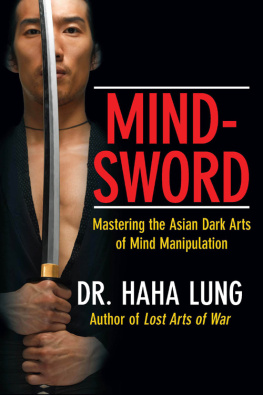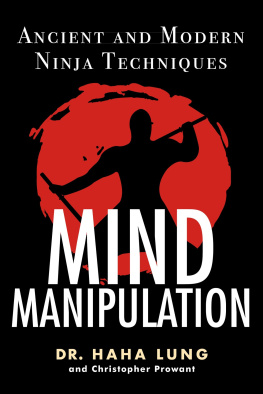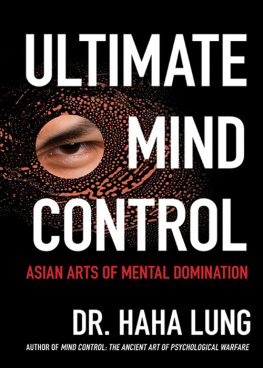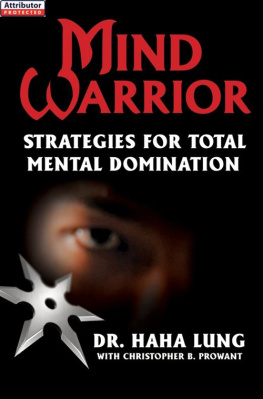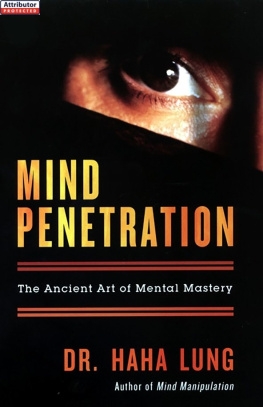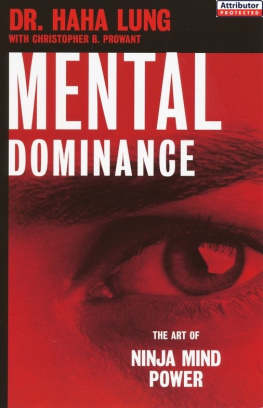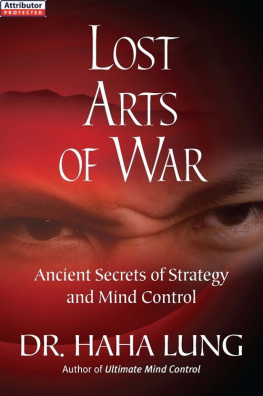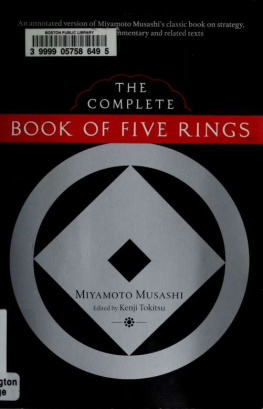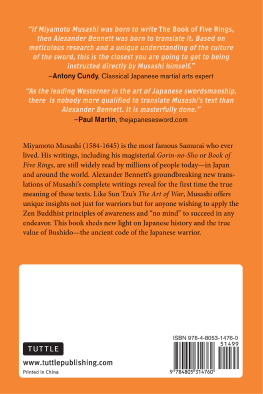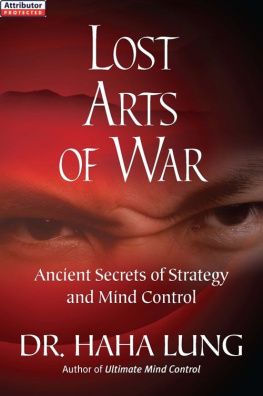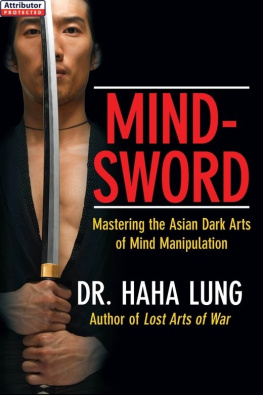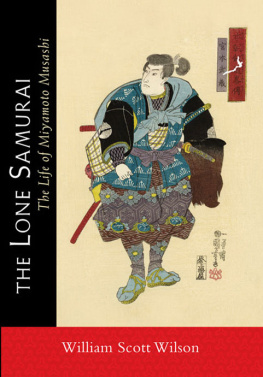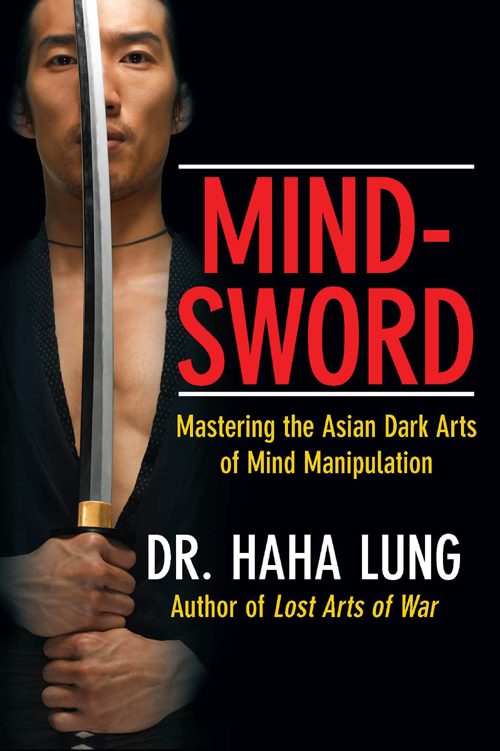ABOUT THE AUTHOR
Dr. Haha Lung is the author of over two dozen published books on subjects ranging from aberrant anthropology and psychology, martial arts, and mind control. Born in Katmandu, Nepal, a graduate of Ashland University in Ohio, he currently holds degrees in psychology, sociology, math, and science. He currently calls Spirit Lake, Idaho, home.
Other books in Dr. Lungs Mind Masters series published by Citadel Press include:
Mind Manipulation (2002)
Mind Control (2006)
Mind Penetration (2007)
Mind Fist (2008)
Mental Dominance (2009)
Mind Assassins (2010)
Mind Warrior (2010)
Ultimate Mind Control (2011)
CONCLUSION
A Good Sword Cuts Both Ways
I N MEDIEVAL J APAN , and still today, Hin-ken are highly prized... despite the inherent danger.
Hin-ken are swords that bring a person great wealth and power... but at a price.
For example, Samurai blades crafted by the great Senzo Muramasa (died 1341) are considered unstoppable, capable of bringing a warrior great victory and power. The downside is that Muramasa himself was a man prone to rage, and so, its believed, his anger seeped into and saturated his magnificent, unbeatable blades.
Thus, anyone brave enough to wield a Muramasa blade runs the risk of being overcome (or overshadowed, if you will) by the angry, malignant spirit ( oni ) that dwells within that blade. Daring to wield a Muramasa blade in combat, a weak-minded man might suddenly find himself thrown into uncontrollable, berserker rage, and, in his blood lust, slaughter friend and foe alike.
Thus, a Muramasa blade, like all blades, is capable of both gifting or gutting a friend or foe, depending on the hand that wields it.
The hand controls the sword. The mind controls the hand.
And of all swords, Musashis Mind-Sword remains ever the most dangerous.
Properly cared for, diligently honed, it can instantly leap from its scabbard to defend kiln, kith, and kin.
Conversely, left to rust, left hanging too long on the wall, why are we surprised when our Mind-Sword sticks in its dusty scabbard, choking at the moment we need it the most?
Any weapon, no matter how advanced, can be stolen from you, whether a switchblade wrenched from your grip during an alley fight, or nuclear secrets spirited away via flash drive.
Even our Mind-Sword can be slowed, soiled, even broken by a thousand ancient and modern plots and ploys and computer programs of confusion, hypnotism, and brainwashing.
When the mind is lost, all is lost.
To their credit, some do prudently protect their mind against influence, against unwanted intrusion, and against theft. Some do this as practical precaution, others from deep paranoia, both burying their thoughts and memories beneath increasing layers of lock and key, in the hopes of some friendlier future....
Ah, but there are others, a scant and sometimes scandalous sort, who daily test and temper and then test again the blade of their mind, regularly anointing that Mind-Sword with ever fresh oils, making ever keen the edge that promises them the Edge over their enemies.
Still, were repeatedly warned, most often by those too fearful to ever take up the sword themselves, that those who live by the sword, die by the sword!
Too much history to deny.
Yet, when it comes to willfully wielding our Mind-Sword...
Better to live by the sword...
And let our enemies die by that same sword!
These three things you must always keep in mind: concentration of strength, activity, and a firm resolve to perish gloriously.
Napoleon
GLOSSARY
Amettori-jutsu: (Jp., lit. a man of straw). Encompasses all tactics and techniques of deception. The name comes from the ploy of dressing up a scarecrow to make an enemy think it is a real sentry or soldier.
ASP: Additional Sensory Perception. The full use of our five senses that gives the impression to others we possess a sixth sense, i.e., ESP
Assassins: Medieval Muslim secret society noted for its terror, treachery, and mind-manipulation techniques.
Atari-kokoeo: Japanese mind-mastery techniques. (See Kiai-shin-jutsu.)
Autogenic: Self-generated therapies (e.g., biofeedback, self-hypnosis, meditation, auto-suggestion), coined by Zafutto and Zafutto, 1974.
Banking: Holding back valuable and/or damaging information (indiscretions, faux pas, etc.) youve discovered about a person for use in blackmailing and/or disgracing them at a later, more opportune time.
Big Brother: Oppressive government, always watching. Coined by George Orwell in his 1948 novel, 1984.
Biometrics: System of scientific measurement of body parts and actions designed to give insight into intent. (See Tells .)
Bio-resources: People whose talents you can utilize to accomplish your goals.
Black Curtain, the: (Jp. Kuromaku, lit. string-puller). Generic, the veil of secrecy and skullduggery a sinister cadre hides behind. Synonym for smoke screen. Specific, the head of a Japanese Yakuza crime family. (See the Illuminati. )
Black Science, the: Any strategy, tactic, or technique used to undermine a persons ability to reason and respond for themselves. Synonym for mind control and manipulation. First coined by researcher C. B. Black.
Blood ties: Dangerous and damaging information we hold over another. (See the Killer Bs. )
C.H.A.O.S. Principle, the: Create Hazards (Hurdles, Hardships, etc.) And Offer Solutions, i.e., profiting from difficulties and crises you have secretly created.
Cheng and Chi: (Ch.) Direct and indirect (i.e., sneaky) actions. Also spelled Zhing and Qi.
Cognitive dissonance: Mental anxiety created when a person must reconcile their contradictory ideas and/or actions.
Cult-speak: Special passwords and coded phrases cults and cliques use to identify one another while marginalizing outsiders.
Cutting-at-the-Edges: Principle coined by Miyamoto Musashi (15941645). When a powerful enemy cannot be attacked directly, undermine his confidence and ability to fight by attacking and otherwise eroding his comfort zone and support network (e.g., family, friends, and financial resources).
Dim-mak: (Ch.) Death touch.
Dropping Lugs (aka Lyin by Implyin): Using innuendo and rumor to plant doubt and seed suspicion, especially intended to undermine anothers credibility.
Dyshemism: Words used as weapons. (See Word Slavery. )
Ekkyo: (Jp.) Divination methods that allow us to determine a victims birth order and examine their interactions with others, especially close relatives.
ESP-ionage: Research and/or application of Extra-Sensory Perception to gather intelligence, e.g., when spying. (Aka Psi-War, not to be confused with PSYWAR, synonym for psychological warfare in general.)
Finders: The International Finders, European Freemason-esque secret society, linked to the Illuminati.
Five Warning F.L.A.G.S.: The five Gojo-goyoku weaknesses: Fear, Lust, Anger, Greed, and Sympathy.
Gojo-goyoku: (Jp.) Five Element Theory. Derived from the Chinese pseudo-science of wu-hsing, which teaches that all reality (including actions and attitudes) is composed of five basic forces: earth, air, fire, water, and void. In all things and all times, one of these elements is dominant. Each element has a corresponding element in opposition to it. (See Five Warning F.L.A.G.S. )

